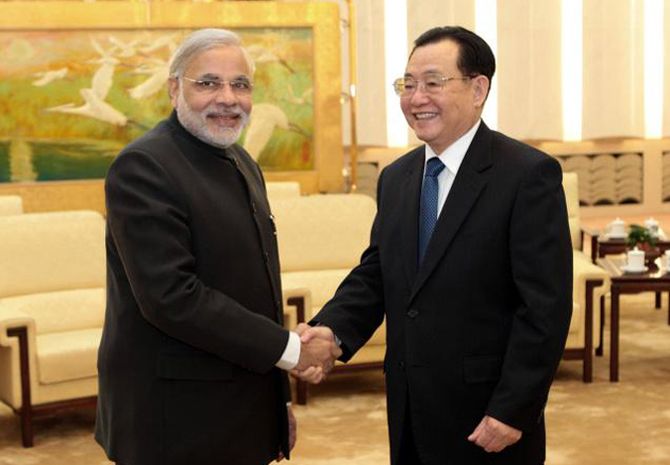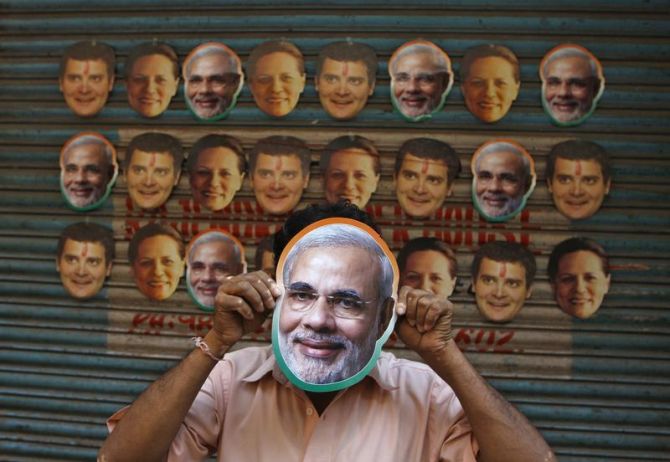
As exit polls point to the Bharatiya Janata Party’s victory in the general elections, a leading Chinese daily on Wednesday expressed hope that the new government likely to be headed by Narendra Modi will be ‘pragmatic’ towards China while adopting a tougher line on the border dispute and Tibet.
“Modi likely to be pragmatic towards China,” the ruling Communist Party of China’s flagship English newspaper Global Times said in its lead story on the front page with mixed projections by official Chinese think tanks.
Complete Coverage: Elections 2014
The experts suggested that while Modi could pursue a ‘more flexible’ economic policy toward China, he may follow a tougher line on the border dispute, Tibet and the Dalai Lama. “Narendra Modi, projected to become India’s next prime minister according to multiple exit polls, is expected to present a tougher stance on political disputes but take a more flexible economic policy toward China,” the daily’s report said highlighting the exit poll results projecting the victory for BJP-led alliance.
In fact this is the second report by Global Times in just over a week projecting positive prospect for Sino-India ties if Modi takes over as prime minister.
...

An article on May 6 by an official think tank, the Shanghai Institute for International Studies, said relations between India and China will get closer if Modi were to head the new government in India. Wednesday’s story even gave a bigger projection for the BJP leader, who visited China four times in the past as Gujarat chief minister and interacted with the leaders while successfully courting Chinese investments in the state.
“Modi, 63, who serves as chief minister of Gujarat in western India, is famed for his pro-business approach, and has made four trips to China to woo Chinese investment,” the Global Times report said.
Judging from Modi’s governance in Gujarat, the daily said he places emphasis on infrastructure development, attracting investment and the establishment of special economic zones. “Economic development and improving people’s livelihoods are expected to be high on his agenda once he is elected prime minister. There is the possibility that he will expand Sino-India economic and trade cooperation and seek more Chinese investment,” Fu Xiaoqiang, a research fellow with the China Institutes of Contemporary International Relations, said.
Fu also highlighted India’s concerns over bilateral trade deficit which touched $35 billion.
Hu Zhiyong, a research fellow with the Institute of International Relations at the Shanghai Academy of Social Sciences, said while closer economic ties between Beijing and New Delhi are expected, Modi has shown a hardline stance against China during his campaign.
...

In February, Modi while campaigning in Arunachal Pradesh, which China claims as southern Tibet, publicly called for Beijing to abandon its ‘expansionist attitude,’ while referring to the two countries’ border disputes, Hu said.
“The BJP has long held a hardline position toward China. Modi will no doubt inherit the party’s stance. He will be tougher against Beijing and use border disputes, the Tibet question and the Dalai Lama to bargain with China,” Hu said.
“The two countries have reached a border defence cooperation agreement last year and both maintained that the disputes should be solved through negotiations,” Fu said, noting the border disputes are controllable and will not threaten bilateral cooperation in other areas.
On the trade imbalance, Hu said it could not be reversed in the short term. Once Modi takes office, he is expected to exhibit some flexibility in economic policy with China, but will also create some new problems on bilateral trade frictions.
While India has been pressing for increase in Chinese investments to compensate for trade deficit, China apparently is waiting for the new government to take over to decide to choose from host of Indian states which offered vast land and facilities to set up Chinese industrial park.
Hu attributed low Chinese investments in India to more cautious and restrictive policies compared to investments from the United States and Japan due to security considerations.
Fu, however, expects a reduction in investment barriers for Chinese companies under Modi’s administration.